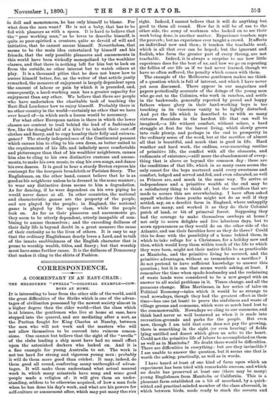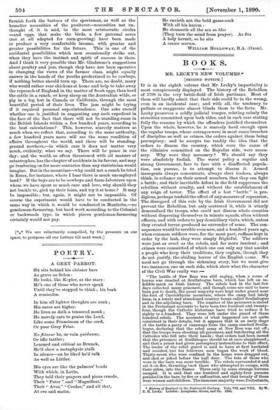CORRESPONDENCE.
A COMMENTARY IN AN EASY-CHAIR : THE MELBOURNE " SWELLS "—COLONIAL EXAMPLE—COW- BOYS AT HOME.
IT is interesting to hear from the other side of the world, amid the great difficulties of the Strike which is one of the advan- tages of civilisation possessed by the newest society almost in a higher degree than the elder world—that the class which is at leisure, the gentlemen who live at home at ease, have stepped into the quarrel, and are mediating after a sort, as the Puritan fought for King Charles at Naseby, between 'the men who will not work and the masters who will not allow themselves to be coerced into ruinous conces- sions. One cannot but believe that the sight of the " swells " of the clubs loading a ship must have had no small effect upon the astonished dockers who looked on. And it is a fine example for young Australia to set. The work is not too hard for strong and vigorous young men : probably it will do them more good than cricket. It may, indeed, do -them good all round, conferring many unthought-of advan- tages. It will make them understand what actual manual work is, which many minstrels have sung and some good 'people made a religion of : it will give them an under- -standing, seldom to be otherwise acquired, of bow a man feels when he has done his day's work, and what are his powers for self-culture or amusement after, which may put many thecries right. Indeed, I cannot believe that it will do anything but good to them all round. How far it will be of use to the other side, the army of workmen who looked on to see their work being done, is another matter. Experience teaches, says the proverb ; but no experience ever taught a crowd. It affects an individual now and then ; it teaches the teachable soul, which is all that ever can be hoped ; but the ignorant and foolish, who form the greater part of every throng, are not teachable. Indeed, it is always a surprise to me how little experience does for the best of us, and how we go on repeating the follies of our life as if we had never learned, though we have so often suffered, the penalty which comes with them.
The example of the Melbourne gentlemen makes me think of a question which is full of interest, and which I have never yet seen discussed. There appear in our magazines and papers periodically accounts of the doings of the young men who go out to the Colonies, who work in ranches, and settle in the backwoods, generally reported by proud and happy fathers whose glory in their hard-working boys is too touching in its vicarious vanity to be lightly disturbed. And yet the life which is described to us with so many virtuous flourishes is the hardest life that can well be imagined,—a life without comfort, without solace, a hard straggle at first for the barest living, which slowly grows into rude plenty, and perhaps in the end to prosperity in the ordinary sense of the word, but at the sacrifice of almost all that is beautiful, and much that is good in life. Hard weather and hard work, the endless, ever-recurring routine of primitive life, the conflict with all the elements, and rudiments of existence,—still more the abandonment of every- thing that is above or beyond the common day : these are the conditions of that life, which in so many cases seems the only resort for the boys nurtured amid every sweetness and comfort, lodged and served and fed, and even educated, as well as Princes are, and much in the same way. To arrive at independence and a primitive wealth at the end may be a satisfactory thing to think of ; but the sacrifices that are made to secure this are overwhelming. I have often asked myself whether these youths might not do as well if they settled, say, on a derelict farm in England, where unhappily there are many, and worked it as they do their Colonial patch of land, or bit of primeval forest. Supposing they had the courage to make themselves cowboys at home ? not only to scorn delights and live laborious days, but to scorn appearances as they would do on the other side of the Atlantic, and use their faculties here as they do there ? Could this be done with the possibility of a home behind them, in which to take refuge for a Christmas, for a holiday now and then, which would keep them within touch of the life to which they were born, might not their native fields be as practicable as Manitoba, and the primitive living be secured, and the primitive advantages, without so tremendous a sacrifice I do not pretend to have sufficient knowledge to answer this question ; but it is one that seems worth asking, at least. I remember the time when spade-husbandry and the reclaiming of waste lands were considered to be a new gospel with an answer to all social problems in it. Times change, and all the
panaceas change. Miss Martineau, in her series of tales on Political Economy—tales which it would be so strange to read nowadays, though they had the greatest effect in their time—has one (at least) to prove the sinfulness and waste of village greens and commons, which were so much land lost to
the commonwealth. Nowadays we cling to our commons, and
think land never so well bestowed as when it is made into recreation-grounds and parks for the people. But even now, though I am told that corn does not pay the growing, there is something in the sight (or even hearing) of fields lying untilled and desert which gives an ache to the heart.
Could not the primitive life of labour be accomplished on them as well as in Manitoba? No doubt there would be difficulties. There are difficulties in everything : but are they invincible ? I am unable to answer the question, but it seems one that is worth the asking, practically, as well as in words.
I have heard at least of one kind of farm upon which an experiment has been tried with remarkable success, and which no doubt has preserved at least one (there may be many) young Englishmen from Manitoba or California. This is a pheasant farm established on a bit of moorland, by a quick- witted and practical-minded member of the class aforesaid, in which between birds, made ready to stock the coverts and
furnish forth the battues of the sportsman, as well as the homelier necessities of the poulterer—necessities not un- thought of, it is said, in the most aristocratic circles and eggs, that make the birds, a few paternal acres (not at all adapted for corn-growing) have been made to produce a very comfortable income, with greater and greater possibilities for the future. This is one of the accidental possibilities which men occasionally strike out, when they have the instinct and spirit of success in them. And I think it very possible that Mr. Gladstone's suggestions about poultry and jam, though they have not been operative in changing the views of the farmer class, might equally answer in the hands of the youths predestined to be cowboys, if nothing better should turn up. There are, no doubt, many who would rather rear chickens at home and help to take away the reproach of England in the matter of fresh eggs, than herd the cattle in a ranch, or keep sheep on the Australian wilds, or pig in a log but in Canada or California, through the most beautiful period of their lives. The jam might be trying if it required personal superintendence. One asks oneself whether one is justified in suggesting any such expedient in the face of the fact that there will not be standing-room in the British Islands within a few hundred years, according to the best calculations ? This, however, scarcely matters so much when we reflect that, according to the same authority, a few hundred years more will see the same condition of affairs throughout the world, and there will be standing- ground nowhere,—in which case it does not matter very much, evidently, what we say. There will be peace in our day; and the world, so often threatened with all manner of catastrophes, has the chapter of accidents in its favour, and may go lumbering on for more centuries than any statistician would imagine. But in the meantime—why could not a ranch be tried in Essex, for instance, where I hear there is much unemployed land ? If the boys are to be cowboys and farm-labourers upon whom we have spent so much care and love, why should they not buckle to, gird up their loins, and try it at home ? It may be impossible; but, again, it might not be impossible. Of course the experiment would have to be conducted in the same way in which it would be conducted in Manitoba,—no gentleman-farmering, but hard work according to the Colonial or backwoods type, in which places gentleman-farmering certainly would not pay.



















































 Previous page
Previous page